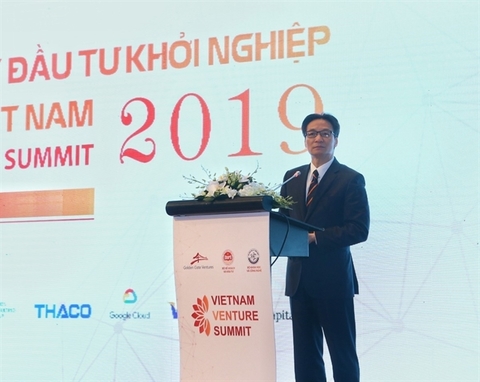
Deputy Prime Minister Vu Duc Dam delivers his speech at the Vietnam Venture Summit 2019 on Monday. — VNA/VNS Photo Danh Lam
The regulatory framework was still the biggest challenge for the Vietnamese start-up community, speakers said at a summit on Monday.
Vietnamese start-up companies ware still seeking opportunities to set up their head offices in foreign countries as regulations in overseas markets were often easier than those in Viet Nam, a lawyer told Viet Nam News.
The policies were too complicated and inflexible, he said at the Vietnam Venture Summit 2019 on Monday, adding many requirements had prevented the development of local start-up businesses.
In addition, start-up businesses had little understanding of the legal framework, their information was not transparent enough and there were still internal problems that needed resolving, he said.
According to Topica Founder Institute, Vietnamese start-up companies received US$889 million worth of investment in 92 deals from both domestic and foreign investors in 2018. The figure was triple the number in 2017 and six times the number in 2016.
Data from KrAsia Bain&Co showed Series A investment in Vietnamese start-up companies was worth $150 million in 2018, twice the figure in 2017. It was expected to rise to $205 million, $320 million and $440 million in each of the next three years.
There are now 3,000 start-up companies in Viet Nam, 1.67 times the number recorded in 2015, proving the Vietnamese start-up ecosystem has developed strongly.
Eddy Hong, chief executive officer of the South Korean investment firm Nextrans, said his business had invested in nine companies in the last four years, raising $40 million.
He expected to make further investments in eight other companies and targets 100 companies next year.
Hong sees great potential in the Vietnamese start-up community as “there will be so many start-up firms to come to the market and there is a good opportunity for us to define great entrepreneurs”.
More than 40 per cent of people in Viet Nam had smartphones and 50-70 per cent of the total population had mobile phones, so there were a “bunch of opportunities to give them great services, not only in HCM City but also in other provinces”.
Despite Government support and ease of business-doing requirements, it remained difficult for both foreign investors and Vietnamese start-up companies to co-operate in Viet Nam.
“Foreign investors like us prefer to buy shares (in start-up companies) in Singapore,” Hong told Viet Nam News. “Most start-ups have set up parent companies in Singapore and 100 per cent of their entities in Viet Nam are operational companies.”
“It takes us a long time to put our money into Vietnamese companies after signing agreements. But in Singapore, we can sign the contract and wire transfer the capital overnight,” he said.
In Viet Nam, it may take foreign investors one or two months, even three or five, to invest in local firms even if they had provided every kind of document needed, he said.
Agreeing that regulations were still challenging the growth of domestic start-up companies, Pham Nguyen Bach, chief financial officer of Bepos, said investors wanted to buy and sell shares easily.
But it is difficult for them to do so because of the mountain of paperwork needed before an official decision could be made, he told Viet Nam News.
“When I first called for foreign capital, investors told me to set up the head office in Singapore and move the entire legal entity there, thus the Vietnamese firm could become the subsidiary,” Bach said.
“That kind of move will help investors buy and sell their stakes in the company much easier.”
Speaking at the summit, Deputy Prime Minister Vu Duc Dam said there must be a way to create a better environment for Vietnamese entrepreneurs so they don't have to look overseas.
He also asked for support from bigger companies to help Vietnamese start-ups to grow. “We need to encourage the realisation of the craziest and most creative ideas.”
“We also need to encourage the entrepreneur community to spread the message through the whole community so that Vietnamese start-ups can develop, contribute to Viet Nam’s economic growth and expand their influence in other markets.
The Deputy PM urged Government agencies and local authorities to find ways to improve business conditions, make breakthroughs in technological development, and pay more attention to education and training for young people. — VNS